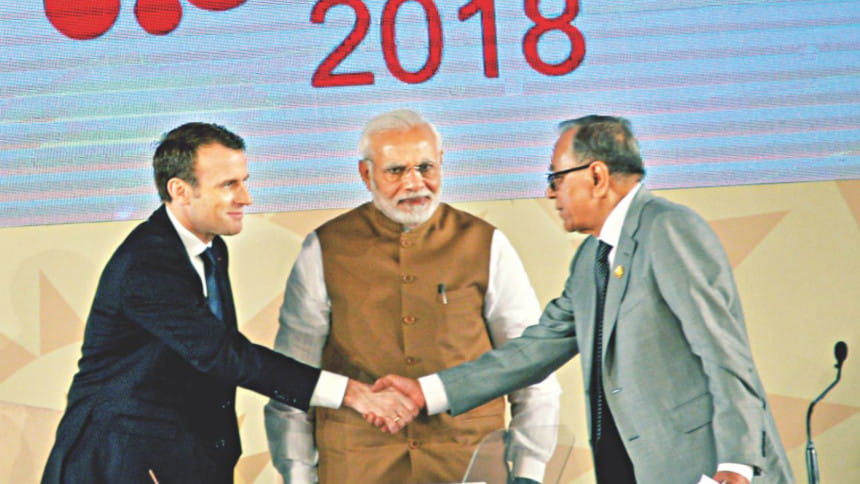Ensure affordable solar energy

Bangladesh yesterday called for ensuring transfer of technology and allocation of adequate funds for promoting affordable and sustainable use of solar energy in developing countries.
Speaking at the founding conference of International Solar Alliance (ISA) at the Rashtrapati Bhavan in New Delhi of India, President Abdul Hamid said Bangladesh is one of the worst sufferers of climate change.
“Even though Bangladesh's share in emitting greenhouse gases is 0.1 percent, threats to Bangladesh are abundant. These include sea level rise, droughts, floods, and cyclones,” said the president.
“Bangladesh is nevertheless putting its best efforts to make a fair contribution in fighting this challenge.”
Hamid hoped that ISA would widen the opportunities for all its member countries to collaborate with each other in all areas of solar energy -- funds and resources, research and development, technology transfer and capacity building.
He said Bangladesh is “always ready to mutually collaborate and cooperate for ensuring affordable, reliable, sustainable and modern energy for all."
Since India and France are providing funds to ISA member-countries for setting up projects on solar energy and global financial institutions, the cost of solar projects would come down, President Hamid hoped.
Indian Prime Minister Narendra Modi and French President Emmanuel Macron co-chaired the founding conference of ISA, attended by dignitaries from over 50 countries and organisations including United Nations Secretary-General António Guterres and Venezuelan President Nicolás Maduro.
ISA aims at tapping solar energy in sunshine-rich countries that lie partially or fully between the Tropics of Cancer and Capricorn. The ISA summit aims to mobilise US $1 trillion of investments needed by 2030 for an extensive deployment of solar energy under 121 projects.
President Hamid said Bangladesh strongly believes that the development of renewable energy is necessary for developing countries. “... it is from the point of improving energy access for rural and hard to reach people. It is also indispensable for the safety of our planet.”
The world community has an obligation to play a significant role in this arena, Hamid said. “In this regard, we deeply appreciate the leaderships of India and France for establishing the International Solar Alliance.”
Hamid said the Bangladesh government has undertaken a number of programmes to enhance the use of renewable energy and has installed around five million home solar systems, serving around 20 million people and the government has initiated a programme to generate 500 megawatts of solar-based electricity for the national grid.
Enhanced use of solar power-based energy-efficient cooking stoves in rural areas has significantly reduced emission of harmful gases and there is a potential in the use of solar-powered irrigation pumps. “Renewable energy policy [of Bangladesh] also dictates that 10 percent of our [Bangladesh's] total electricity requires to be generated from renewable sources by 2021,” he said.
“Our priorities are often underpinned by developmental goals of our individual countries. Nevertheless, we should not forget to conserve environment for the benefit of our future generations. To this endeavour, we look forward to the unlocking of a new dynamic in renewable energy with support from and solidarity among the member countries of ISA,” said President Hamid.

 For all latest news, follow The Daily Star's Google News channel.
For all latest news, follow The Daily Star's Google News channel. 



Comments